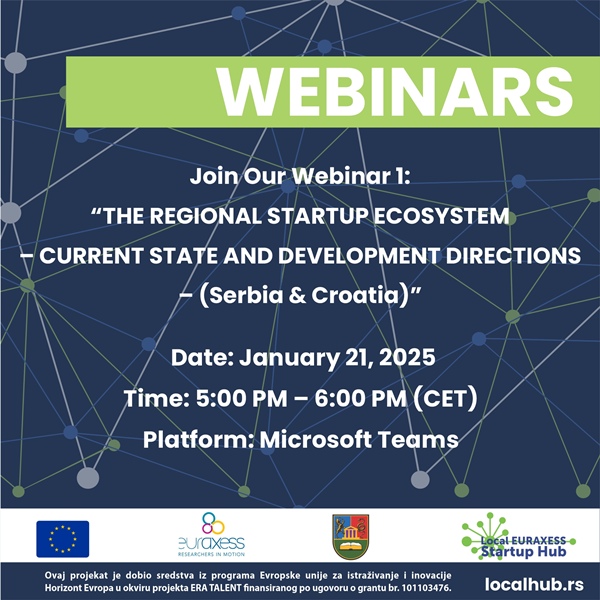Webinar Report: “Regional Startup Ecosystem –State and Development Directions” – Serbia and Croatia
Date: January 21, 2025
Organizer: Horizon Europe ERA Talent – Call for Multiplying the Impact of EURAXESS Hubs
Speakers:
- Miloš Dimitrijević (Coordinator)
- Drago Gverić (Consultant)
Attendies: 10 applied participants
Overview
The webinar focused on analyzing the current state of startup ecosystems in Serbia and Croatia while identifying development directions and strategies to strengthen their roles in the region and globally. A total of 10 participants joined the session.
Miloš Dimitrijević opened the webinar, introducing the objectives and relevance of the topic within the framework of Horizon Europe ERA Talent initiatives. Drago Gverić led the presentation and discussions as the primary speaker.
Key Insights from the Presentation
- Startup Landscape in Serbia and Croatia:
- Serbia: Over 400 startups, primarily in IT, AI, and blockchain. Key challenges include limited access to capital and talent brain drain.
- Croatia: Over 1,000 startups with strong growth since 2022, focusing on green technologies, health tech, and fintech.
- Support and Investments:
- Serbia benefits from government-backed Innovation Funds and active venture capital groups such as SCV and ICT Hub Ventures.
- Croatia’s funding landscape includes Fil Rouge Capital and HAMAG-BICRO, offering grants and venture investments.
- Challenges:
- Both countries face small domestic markets and a need for internationalization.
- Administrative barriers and limited R&D investments remain bottlenecks.
- Opportunities:
- Leveraging EU programs such as Horizon Europe and COSME for funding.
- Developing industry-specific niches like renewable energy and biotech.
- Promoting collaboration between startups and diasporas.
- Regional Cooperation:
- Emphasis on creating joint platforms, regional funds, and networks to enhance startup collaborations across the Balkans.
Key Outcomes and Recommendations
- Strengthen ties between Serbia and Croatia through shared resources, joint events, and mutual support in entering global markets.
- Promote innovation hubs to foster growth in smaller cities beyond capital centers.
- Develop tailored programs for women entrepreneurs and broader participation in the tech sector.
- Enhance education and retraining programs to address the talent gap in high-tech fields.
Conclusion
The session concluded with a Q&A segment where participants shared opinions and exchanged information about the ecosystem’s challenges and opportunities. The webinar highlighted the potential of Serbia and Croatia to emerge as innovation leaders in Southeast Europe, provided they overcome existing challenges through collaboration and strategic investment.
This report summarizes the main discussions and insights shared during the webinar. Further engagement and follow-up events are recommended to maintain momentum and build on these findings.
NOTE: Access to the webinar recording and presentation is restricted to registered members of mentoring program. If you are member and already have an account, please log in. If not, you can register to gain access.




